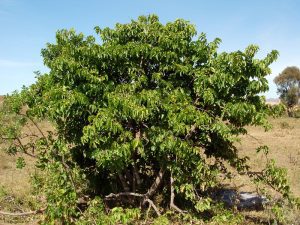African wild medlar Plant (Vangueria apiculata) Benefits and Herbal Uses
Vangueria apiculata Known as the African wild medlar it is a species of flowering plant in the family Rubiaceae. It is found from Ethiopia to South Tropical Africa. African wild medlar (Vangueria apiculata) has a rich history of traditional uses in Southern and Eastern Africa.
The Health Benefits of African wild medlar plant (Vangueria apiculata)
This versatile tree has potential applications in biotechnology, the food industry, and as a functional food crop.
African wild medlar offers several health benefits:
- Nutritional Richness:
- The fruit of V. apiculata is edible and has a sweet flavour. People consume it as a snack.
- It contains significant levels of vitamins, phenols, and macro and micro-nutrients essential for human health.
- Medicinal Uses:
- Stomach Ache Relief: The leaves are used to cure stomach ache.
- Intestinal Worms: Boiled roots serve as a remedy for intestinal worms.
- Malaria and Pneumonia
- Snake-Bite: They are also employed for snake-bite treatment.
- Ringworms
- Menstrual and Uterine Problems
- Toothache
- Swollen Limbs in Children
- Hepatitis
- Fruit:
- The fruits can be consumed raw, or their pulp can be dried and stored for later use.
- The seeds are also edible when roasted.
- Coughs
- Leaves:
- Employed for several purposes:
- Swelling on the Legs
- Inflammation of the Navel in Children
- Abdominal Pain
- Dental Pain
- Employed for several purposes:
- Roots:
- Used to treat various conditions:
- Snake-Bite
- Malaria
- Pneumonia
- Heart Ailments
- Coughs
- Used to treat various conditions:
- Agroforestry Importance:
- V. apiculata plays a vital role in agroforestry systems.
- Wood Properties:
- The wood is hard, tough, and heavy. It is used for poles, pegs, tool handles, fuel, and charcoal.
While research specifically on V. apiculata is limited, its traditional uses highlight its potential health benefits.
The Chemical properties of African wild medlar plant (Vangueria apiculata)

Nutritional Richness:
-
- Almost every part of the tree has known nutritional benefits.
- The fresh or processed African wild medlar fruit contains significant levels of vitamins, phenols, macro and micro-nutrients that humans require in both large and small amounts.
- Due to its richness in biochemical constituents such as flavonoids, phenols, proteins, vitamin C, and zinc, African medlar fruit has the potential to meet the human recommended daily intake (RDI), making it a potential functional food crop
How to use the African wild medlar (Vangueria apiculata) plant as herbal medicines
Here’s how it can be used as herbal medicine:
Rural communities in Southern Africa use African medlar fruit as raw material for value-added products, including jam, juice, alcohol-based products, and medication. Commercializing this crop could contribute to sustainable development goals, addressing poverty (SDG 1) and hunger (SDG 2).
- Roots:
- Malaria, Heart ailments, Hepatitis and Pneumonia: The roots have been traditionally used to treat malaria and pneumonia.
- Snake-Bite: They are also employed for snake-bite treatment.
- Leaves:
- Ringworms: An infusion of the leaves can help treat ringworms.
- Abdominal pain, Menstrual and Uterine Problems: Leaves may be beneficial for addressing menstrual and uterine issues.
- Toothache: Leaves can provide relief from toothache.
- Swollen Limbs in Children:
- A decoction made from pounded leaves and small twigs helps heal swollen limbs in children.
Remember that while traditional knowledge highlights these uses, consulting a healthcare professional is essential before using any herbal remedies.
Safety and side effects
While there isn’t extensive safety research, the traditional use of African wild medlar suggests it is generally safe. As always, consult a healthcare professional before using any herbal remedies.
External links
benefits of African wild medlar
How to use the African wild medlar (Vangueria apiculata) as herbal medicines

